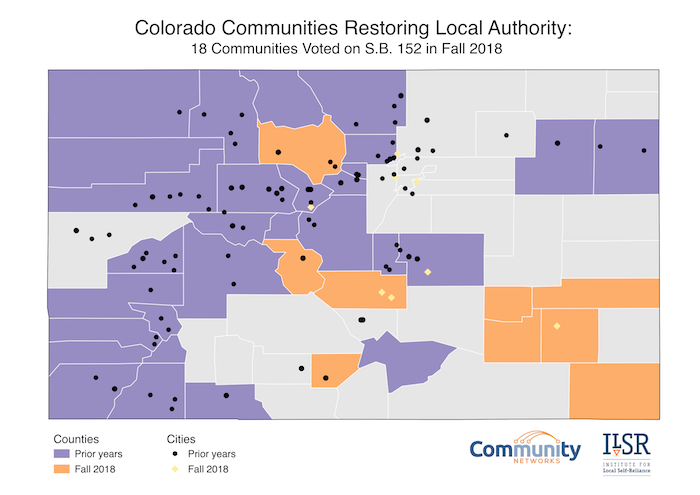
Fast, affordable Internet access for all.

As voters went to the polls yesterday, broadband-focused initiatives and candidates could be found up and down the ballot all across the country.
Alabama
Alabama voters cast their ballots to decide on a state Constitutional amendment known as the Broadband Internet Infrastructure Funding Amendment. The measure sought to amend the state's constitution "to allow local governments to use funding provided for broadband internet infrastructure under the American Rescue Plan Act (ARPA) and award such funds to public or private entities."
That measure passed, garnering a “Yes” vote from nearly 80 percent of Alabama voters. With 73 percent of the vote counted late last night, 922,145 “Yes” votes had been tallied with 251,441 “No” votes.
Also in Alabama, Democratic U.S. Rep. Terri Sewell won her re-election bid to represent Alabama’s 7th congressional district. Sewell, whose district covers a large swath of the Alabama Black Belt, “spent much of her past two years in office bringing American Rescue Plan Act funds to rural Alabama, dedicated to healthcare, broadband access and infrastructure building,” as noted by The Montgomery Advertiser.
Colorado
The Centennial State is not listed as one of 17 states in the nation with preemption laws that erect barriers to municipal broadband because nearly every community that had a vote has passed it to nullify it. But more communities had to go through that unnecessary process yesterday due to the law known as SB-152 that bans local governments in the state from establishing municipal broadband service absent a referendum.
It’s official. Falmouth, Massachusetts has established a legal framework, a telecommunications utility, that is a key milestone in a local effort to bring fiber-to-the-home (FTTH) Internet service to this seaside community of approximately 32,000 famous for being home to a world-class marine science community as well as a popular summer vacation destination.
In the fall, Town Meeting voters voted 175-13 for the creation of the utility called a Municipal Light Plant (MLP). The law, however, requires two separate ‘yes’ votes with a 2/3 majority within a 13-month period. That second vote came earlier this month, when Town Meeting voters said “yes” to establishing an MLP by a vote of 159 to 25, well in excess of the 2/3 majority that was needed.
It allows Falmouth to move to the next step – figuring out the financing – which would allow Falmouth to join the growing ranks of communities in the Bay State (and be the first of 15 Cape Cod towns) to have undertaken municipal broadband projects over the last several years.
Voters Reject Opposition Arguments
Though a small group of municipal broadband critics strenuously argued in opposition to the formation of an MLP by raising a number of thoroughly debunked claims about locally-owned networks, ultimately Town Meeting voters were more persuaded by the experiences of resident’s such as Marilois Snowman who owns a digital marketing agency in town.
In November, a majority of voters in China (not the country, but a small town in Maine) cast their ballots in opposition to a $6.4 million proposal for a municipal broadband network that, if built, would have provided high-speed Internet access to every household and business in this central Maine town of 4,300.
In recent weeks, China residents learned that Consolidated Communications would not be coming to the rescue. As reported by The Town Line, two representatives from Consolidated Communications attended China’s Broadband Committee (CBC) meeting in late January and the company reps “did not encourage (China) to expect an offer from the company to expand [I]nternet service to town residents.”
The CBC estimates that Consolidated currently serves about 20 percent of the town, while Spectrum serves about 70 percent of China’s households. But for the remaining 10 percent of China households without access to high-speed Internet service, the CBC meeting was a disappointing dose of post-election news.
Consolidated representatives Simon Thorne and Sarah Davis told the CBC that China is nowhere close to the top of their expansion plans, as the company bases its decisions on a combination of four primary factors: projected cost to build, number of potential customers, expected take rates, and whether a competitor also serves that market.
China’s population density is too low to offer enough profit to attract investors.
And just to be clear, when CBC member Tod Detre suggested the company is focused on “more profitable areas,” Davis replied, “You nailed it.”
‘Spirited Discussion’ About November Election
That, of course, led to a “spirited discussion” about last November’s election results. Ronald Breton, chairman of the select board and a guest at the CBC meeting, was emphatic in saying that town officials were still interested in facilitating town-wide connectivity, noting how even after the November ballot question failed the town select board unanimously voted that the CBC remain intact.
Cities and towns all over Massachusetts are looking for alternatives to the big incumbent Internet Service Providers in their communities as citizens across the Commonwealth have grown weary of the high-cost, second-rate Internet service – and lack of competition – that plagues markets dominated by monopoly providers.
Gov. Charlie Baker and state lawmakers have yet to settle on how much of the Commonwealth’s American Rescue Plan funds should be devoted to expanding access to affordable and reliable high-speed Internet service in the Bay State. Meanwhile, a growing number of local leaders and community advocates are positioning themselves for the possibility of creating municipal telecommunications utilities to build publicly-owned broadband infrastructure.
Falmouth Leads the Way on Cape Cod
On Cape Cod in the Town of Falmouth (pop. 32,517), the citizen-led non-profit FalmouthNet is making major strides in bringing town-wide fiber-to-the-home Internet service to the second-largest municipality on the southeastern Massachusetts peninsula. (Full disclosure: both Sean Gonsalves and Christopher Mitchell serve as FalmouthNet Advisory Board members).

Having completed a feasibility study last year that laid out a detailed market analysis and financial forecast for building the estimated $55 million town-wide fiber network, FalmouthNet recently announced it has signed a contract with Tilson, a telecom construction and engineering firm based in Portland, Maine, to design the network.
Broadband was on the ballot as voters went to the polls for Election Day in many areas. Here’s a quick run-down of what happened.
Colorado
The Colorado state law (SB-152) that bans local governments in the Centennial State from establishing municipal broadband service suffered another defeat at the ballot box. Since the law was passed nearly two decades ago, more than 150 Colorado communities have opted out. That number continues to grow and we can now add the town of Windsor to the list of municipalities in the state who have voted to restore local Internet choice.
At the polls yesterday, 77 percent of Windsor voters said yes to Ballot Question 3A, which asked “shall the Town of Windsor, without increasing taxes by this measure, be authorized to provide high-speed Internet services (advanced services), telecommunications services, and/or cable television services … either directly or indirectly with public or private sector partners?”
Update (6/25/20):
The board of the New Hampshire Electric Cooperative voted unanimously at yesterday's meeting to create a separate entity to pursue broadband funding and development in the state for its 84,000 member-owners, committing $1 million in funding to the effort.
In the press release, President and CEO Steve Camareno remarked: “meeting our members’ needs is NHEC’s only focus, and the ability to access fast, reliable internet service is a critical need, now more than ever. In pursuing this initiative, we remain mindful that we must balance that need with our members’ reliance on NHEC as their electric service provider.”
The response by the board shows the success of local organizing efforts around the issue; voting was up 33% at the annual board meeting last week, where adding broadband to cooperative's charter was a primary concern. The move positions NEHC well to pursue money from the state's available CARES funds as well as bid in the Rural Digital Opportunity Fund auction this fall.
Original story:
Efforts to add broadband to the New Hampshire Electric Cooperative’s (NEHC) charter fell just 2% short of the 2/3 supermajority it needed to pass last week, but supporters remain hopeful. Over seven thousand voters turned out for the annual Board of Directors election, which included the broadband line item on the ballot. The measure fell short by 183 votes. A successful vote would have allowed the co-op to build a broadband network and offer Internet access to its members.
Iowa already has more municipal broadband utilities than many other states and the voters in Fort Dodge decided on November 5th, that that it's time for one more. "Yes" votes came in at around 72 percent of the total while 28 percent of those casting ballots decided against a measure to grant authority for a municipal telecommunications network.
A Copper Island in a Sea of Fiber
In June, consultants described the way Fort Dodge had become "an island of copper in a sea of fiber to the home." Local rural cooperatives around the city of around 24,000 have been investing in Fiber-to-the-Home (FTTH) while incumbents Mediacom and Frontier still rely on old infrastructure to serve the more densely populated city areas. Curtis Dean from SmartSource Consulting noted that people in the rural areas served by the co-ops likely have access to better connectivity than those living within Fort Dodge. The city had hired SmartSource to evaluate the broadband situation in Fort Dodge and make recommendations.
The results of a survey and assessment of connectivity in the community encouraged community leaders to ask voters for the authority to look further into a possible municipal telecommunications utility.
At an October forum, Mediacom representatives argued their case against a "yes" vote on the proposal. Those that attended, offered negative comments to Mediacom about the service they've received from the company. Frontier Communications, another major Internet service provider in Fort Dodge, didn't bother to send a representative to the forum.
Even though there are more than 140 municipalities and counties that have voted to reclaim local telecommunications authority from the state, the City and County of Denver, Colorado, has put off such a referendum. 2020, however, may be the year that the metropolitan region votes to shed themselves of the harmful restrictions of SB 152.
Councilman Paul Kashmann announced earlier this month that he supports the city taking the question to the voters, like so many other local leaders have already done in Colorado. He suggests putting it on the 2020 ballot. At a policy committee on October 9th, Kashmann told his colleagues:
“Make no mistake that the Internet is much more than Netflix and Facebook and Twitter and Minecraft and the like,” Kashmann said. “The Internet is truly … the library of the 21st century. It’s the entry point into the world of information in the same way as our traditional brick-and-mortar libraries have been for centuries.”
 Comcast and Centurylink provide Internet access to the community of around 620,000 people. Even though the large corporate providers tend to concentrate their investments in urban areas like Denver, the issue of affordability still keeps many urban dwellers on the wrong side of the digital divide.
Comcast and Centurylink provide Internet access to the community of around 620,000 people. Even though the large corporate providers tend to concentrate their investments in urban areas like Denver, the issue of affordability still keeps many urban dwellers on the wrong side of the digital divide.
The Denver Public Library lends out between 115 - 120 mobile hotspots and the wait list can extend as long as 200 names at a time. Libraries from which the hotspots are most often borrowed tend to be in areas where fewer people have home Internet access. The library estimates that approximately 20 percent of the city’s residents aren’t connecting at home.
Kashmann stated that he’s anticipating pushback from incumbent Internet access providers. He looks on the measure as in the same light as any other necessary utility:
Earlier this week, Presidential hopeful Elizabeth Warren released her Plan to Invest in Rural America, which contained a framework for improving broadband policy and expanding high-quality Internet access.
You can read her full plan on Medium.
Funding Needed, Spent Wisely
Some of Warren’s goals for proposed policy changes include:
Warren’s plan also focuses on financing infrastructure development in rural areas, and creates some guidelines to address the problems with the current system. Her plan includes:
Improving the FCC
Warren also wants FCC Commissioners who will restore network neutrality protections and improve mapping. By making changes in the FCC’s Office of Native Affairs and Policy, Warren plans to further attack the digital divide for indigenous people.
Read more of Elizabeth Warren’s Plan to Invest in Rural America at Medium.
A total of 40 counties and 102 municipalities have now chosen local telecommunications authority by passing ballot measures to opt out of restrictive state law. Last November, 18 counties, cities, and towns voted to join the expanding list of communities opting out of SB 152, which revoked local telecommunications authority in 2005. We decided to update our map to get a new visualization of what the situation now looks like in Colorado.
Take a gander:

Moving Across the State
The map, updated by Intern and Mapping Maven Hannah Bonestroo from an earlier version created by former Research Associate and Visualization Virtuoso Hannah Trostle, shows how the decision to opt out is sweeping from region to region. Earlier referendums centered in the Mountain and into the Western Slope and San Luis Valley communities. During this past election cycle, most of the counties bringing the issue before voters were in the Plains region.
In past years, mountain towns, often resort communities, were looking for better connectivity when big ISPs considered deployment too challenging and expensive in their geographies. Now, it appears that the rural and less populated Plains communities are seeing value in reclaiming local authority.
With fewer population centers in the Plains region, farms and ranges fill much of this section of the state. Large, corporate ISPs don’t consider this type of landscape profitable due to the lack of population density, however, farmers and rangers require high-speed Internet access for various reasons. Crop and livestock monitoring and realtime reporting are only a few of the ways 21st century agricultural professionals use broadband.
Colorado’s Free Communities
In Colorado, there are 271 active incorporated municipalities, 187 unincorporated Census Designated Places (CDPs) and other small population centers that are outside of CDPs or municipalities. To date, the 102 municipalities that have elected to opt out of SB 152 have all been incorporated municipalities, or approximately 38 percent.